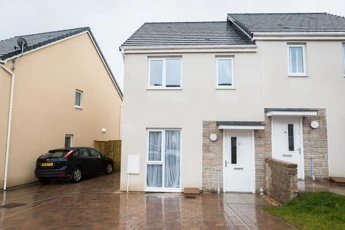As the UK gears up for the 2024 Autumn Budget on 30th October, many are wondering what’s going to happen to mortgage rates, homebuyer finances, and the housing market in general.
As the housing market shows signs of stability, with mortgage rates slowly decreasing and approvals increasing, and the Bank of England (BoE) holding the base rate to 5%, how will the Autumn Budget affect mortgage rates and the housing market? Our Deputy CEO, Ben Thompson, has some thoughts:
For more detail about the Autumn Budget and how it might affect mortgage rates, keep reading.
How will mortgage rates be affected?
The base rate, set by the BoE, will likely stay the same for a while. We may see a drop after the budget when the Monetary Policy Committee meets on the 7th November, but we’ll be looking at the December meeting as well.
While a drop in the base rate would be good news for homebuyers, mortgage rates tend to reflect coming changes before they even happen. Lenders and banks have a sense of what’s on the horizon and will make adjustments to their own interest rates in advance of any big announcements. Because of this, we may see mortgage rates drop or rise slightly ahead of the budget.
If you’re buying or remortgaging soon, talk to a mortgage adviser now. A fixed mortgage rate is valid for six months but can be changed if something better suited to you comes along. Securing a rate now doesn’t mean you’re tied to it. If rates drop after the Autumn Budget, your adviser will work with you to find a new rate if it’s right for you.
We spoke to one of our expert mortgage advisers, Jack Gear, to get his take on the situation:
“I’d look at securing a rate before the budget hits. While I don’t think it’s going to do what the infamous Truss budget did to us two years ago, there’s no harm in being prepared. Whether you’re due for a new rate in two months or six, get it done now. If nothing happens, great. But if it does, you’ll be glad you prepared. It doesn’t cost you any more to be ahead of the game. Most likely, everything will be fine and rates will continue to move downward, and no one will be worse off either way, but at least you’ve taken action to avoid any nasty surprises.”
Will Stamp Duty change in the Autumn Budget?
One of the key issues of this budget is the planned reversal of Stamp Duty relief, which will come into action in March 2025. Right now it’s unclear if further amendments are on the horizon. Buyers can take advantage of the nil rate threshold, which is the value of the property they are not paying tax on, but after that, the thresholds and tax numbers change.
Here’s what we know so far, which may be confirmed in the budget but may also be amended:
- The current threshold for first time buyers is £425,000 but will drop to £300,000
- The nil rate threshold for homeowners moving will return to £125,000 from £250,000
- The max purchase price first time buyers can claim relief for will return to £500,000 from £625,000
The main concern is that these Stamp Duty reversions don’t necessarily account for how much house prices have risen over the last few years. Levels have recently reached record highs over the last few months, according to Halifax. In fact, the average house price in the UK is now £266,094 and £524,685 in London1. While first time buyers in some areas won’t be affected by Stamp Duty, the drop from £425,000 to £300,000 will be significant for those buying in the more expensive regions of the UK.
While Labour are facing pressure to extend the relief or even overhaul the system entirely, it’s unclear whether this will happen. Calls from the industry are gaining traction, but as of now, no official announcements have been made.
Changes to Capital Gains Tax
Capital Gains Tax (CGT), which applies to the sale of second homes and buy-to-let properties, is on the Chancellor’s radar. While Labour have promised not to increase income tax, national insurance, or VAT, they have hinted at potential CGT changes.
The current rate for residential properties is 24%, reduced from 28% earlier this year. This is significantly lower than the highest tax bands, which the government may look to balance. A change in CGT that mirrors income tax would affect the UK’s top earners the most, reflecting Labour’s previous statements that those with the “broadest shoulders should bear the heavier burden.”
At this point, we can only speculate as to whether there will be changes to CGT and what those changes will look like, but stay tuned for more information.
Will there be any new buying schemes?
Labour have pledged to extend the mortgage guarantee scheme, to be minted as ‘Freedom to Buy.’ This would extend the 95% mortgage scheme, which allows first time buyers to get on the property ladder with a 5% deposit. The scheme was initially extended to 2025 by the previous government, but Labour are looking to make it a permanent feature of the housing market.
One of our mortgage advisers, Kate Fuller, told us:
“Many lenders have their own in-house versions of the 5% deposit scheme, which makes it possible for them to set their own regulations and eligibility and move away from the restrictions of the mortgage guarantee scheme rules.”
Ultimately, it’s important that there’s diversity in the market, and having a formal extension is a good thing, but where lenders feel they can offer a more tailored experience, they have the freedom to do that as well.
What buying schemes currently exist?
On the topic of tailored experiences, we wanted to briefly mention two other homebuying schemes that already exist, which buyers can take advantage of whether they’re first time buyers or not.
Own New
Own New is open to first time buyers and existing homeowners, and offers reduced mortgage rates for an initial fixed period. This is not a government scheme, but rather one developed by housebuilders. Lenders and developers are always trying to find ways to make the homebuying process more accessible for all types of buyers, and this is a prime example of that.
Shared Ownership
Shared Ownership is a housing scheme backed by the government and supported by housing associations and landlords. With Shared Ownership, buyers purchase a share of a property and rent the rest of the value. This can make both mortgage payments and rent lower, potentially improving affordability.
While both are only available on newly built homes, the mortgage guarantee scheme isn’t restricted to just new builds. It’s important to have options available, and we’ll hopefully find out more about the scheme in the coming budget talks.
Looking ahead and what you should do now
Though the Autumn Budget may not bring immediate changes to mortgage rates, there might be wider implications for the housing market. With potential changes to Stamp Duty and Capital Gains Tax, the government appears to be attempting to strike a balance between fiscal responsibility and the housing crisis - namely the affordability of housing.
While we await further announcements, our mortgage advisers have been weighing in on how these changes might impact the market:
Kate Fuller: “I don’t think we’re going to see anything major or specific for housing. I think we’re more likely to see a reduction in planning rules, which might help with the backlog of new build approvals. They might also give out more money to councils to help them build. What I do know is if there are any major financial changes, it’s unlikely to take immediate effect. It’s reasonable to assume that any changes will take place from the start of the new financial year.”
Rob Brookes: “A wise man once told me that until something is policy, it’s not. And so, it can be difficult to advise somebody to do something against predictions, because you just don’t know what’s going to happen. There’s plenty of moving parts and we can have reasonable expectations, perhaps with things such as interest rate changes. The best thing that anybody could do right now is get advice - whether that’s from your mortgage adviser or financial adviser.”
Remember, if you’re remortgaging soon and are holding off because mortgage rates might come down, our advisers can talk to you about finding a mortgage interest rate now. Securing a rate now doesn’t mean you’re stuck with it. In fact, if rates do go down, and your adviser finds you a cheaper deal, they will let you know.
It’s always better to be prepared and avoid your lender’s standard variable rate, since these tend to be much higher than any fixed rate you could get.
Talk to us today and let’s see what we can do for you.
Frequently asked questions
Average mortgage rates have been steadily going down throughout 2024, particularly for those with bigger deposits.
Read more here: Will mortgage rates go down in 2024?
While we can't predict exact numbers, we should see some base rate drops next year, which should help mortgage rates come down.
The next base rate/interest rate decision will be announced on the 7th November, 2024.
If you're remortgaging soon, then lock in a mortgage rate as soon as possible. You can always change this later before you finalise your mortgage and a better deal becomes available.
The Autumn Budget for 2024 will take place on the 30th October.
Sign up to our monthly newsletter
Stay up-to-date with all the latest mortgage news and homebuying tips with our monthly newsletter. Jam-packed with helpful information and advice, you'll always know what's happening in the industry and how it might affect you.
Whether you're a first time buyer or getting ready to remortgage, we're here for you with helpful tools, articles and information delivered straight to your inbox.
Important information
Your home may be repossessed if you do not keep up repayments on your mortgage.
There may be a fee for mortgage advice. The actual amount you pay will depend on your circumstances. The fee is up to 1% but a typical fee is 0.3% of the amount borrowed.
Related Articles
Will mortgage rates go down in 2024?
Will mortgage rates go down in 2024? UK homeowners faced soaring mortgage rates in 2023. Discover the economic factors and forecasts shaping 2024's outlook.
Does it matter if the market is going up or down?
If you are buying and selling a home, how much does the housing market matter?
How does inflation affect mortgage interest rates?
When inflation changes, it may leave you with questions around how this can affect interest rates and your mortgage. Here’s everything you need to know.
No posts currently available
Ready for some advice? - arrange a call back
References:




